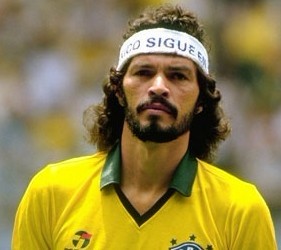(单词翻译:单击)

Obituary;Sócrates;
讣告;苏格拉底;
Sócrates Brasileiro Sampaio de Souza Vieira de Oliveira, Brazilian footballer and political agitator, died on December 4th, aged 57.
巴西足球员及政治鼓动者苏格拉底·奥利维拉于12月4日辞世,年仅57。
One was short, fat and famously ugly; the other was handsome, slim and very tall indeed, with tumbling dark curls caught back in a headband. One skulked about in a grubby robe and sandals; the other shone in blue micro-shorts and the sun-yellow shirt of Brazil. One wandered round the market place, teasing out the Good with onslaughts of severely logical questions. The other played football; and that was pretty good, too.
一个身材矮小、体态肥胖、丑得出奇;另一个身材修长、个子高挑、英俊潇洒,头箍后一袭卷发飘洒。一个身着脏脏长袍、脚踩邋遢凉鞋;另一个下着蓝色短裤、上穿巴西金黄色衬衫。一个徘徊于集市之间,用严密的逻辑问题狂轰滥炸,诱导出“善”。另一个是足球运动员,技艺同样精湛。
The fact that both men were called Socrates was not the only link between them. For the one born in Belém do Pará, at the humid mouth of the Amazon, was also an intellectual. In a sport in which most players’ brains soon take residence in their boots, he talked of Van Gogh and Cuban history, practised medicine and worried about democracy. Over a career that included almost 300 games for his main club, Corinthians of Seo Paulo, and 60 games for Brazil, he trod the pitch as a man of thought, reading the game like a mathematician before, almost nonchalantly, applying some genius touch.
两人都叫“苏格拉底”并不是他们之间唯一的联系。因为出生在贝伦杜帕拉 (Belém do Pará)(位于潮湿的亚马逊河口)的苏格拉底同样也是一位知识分子。在足球世界里,大多数运动员的头脑很快就根植于球靴之中,而苏格拉底却谈论梵高 (Van Gogh) 及古巴史,行医济世,忧心民主。在苏格拉底主要效力的圣保罗科林蒂安斯 (Corinthians) 球队的近 300 场比赛以及代表巴西出场的 60 场比赛中,他是纵横球场的思想者,像数学家一样阅读着场上比赛,随后便是天才般的点睛之笔,几乎若无其事一般。
Whether this love of wisdom had soaked in with the baptismal water, or whether he had picked it up in the library proudly assembled by his self-taught father (who also named two of his brothers Sófocles and Sóstenes), no one knew. He himself said his childhood heroes were Fidel Castro, Che Guevara and John Lennon. Yet his book, “Football Philosophy”, ended with a maxim that would have pleased his namesake: “Beauty comes first. Victory is secondary. What matters is joy.”
苏格拉底对智慧的热爱是否沉浸于洗礼的圣水中,是否受熏陶于自学成才的父亲自豪地修建的图书馆里,无人知晓。苏格拉底的父亲还将他的另外两个兄弟分别起了索福克勒斯 (Sófocles) 和所提尼 (Sóstenes) 的名字。苏格拉底说,他童年时的英雄是菲德尔· 卡斯特罗(Fidel Castro)、切· 格瓦拉 (Che Guevara) 以及约翰· 列侬 (John Lennon)。然而,其著作《足球哲学》却以一句箴言结尾:“美丽第一。胜利第二。快乐很重要。”这样的格言可能会取悦古希腊的哲学家苏格拉底。
He meant what he said. He was never in a team that won the World Cup (though Brazil has done so five times); but then the relentless focus and discipline required to lift that trophy never pleased him. Like his namesake, he sought Beauty. And spectators found it whenever he played, with his elegant gazelle runs, his leaps and accelerations, his classy back-heels and his long, loping passes from midfield. There were few keener reminders of the Beautiful than the game against Italy in the 1982 World Cup, when he was captain: a game of surpassing skill and spontaneity capped by a wonderfully deceptive goal of his own, almost disguising the fact that Brazil then lost and left at the second-group stage.
他言必行,行必果。他从未随队夺得过世界杯冠军(仅管巴西已经五度称雄);但是捧得冠军奖杯所必需的无情专注与铁的纪律从未让他开怀。同哲学家苏格拉底一样,他追寻“美”。而且只要他踢球,观众就能发现“美”:他那如同羚羊般优美的奔跑,他那一个个跳跃、一次次加速以及他那华美的中场后脚跟传球和大步长传。1982 年世界杯,苏格拉底担任队长对阵意大利的比赛对“美丽”的诠释可谓登峰造极:比赛技艺卓越、自然流畅,最终以苏格拉底的一粒虚晃进球收尾,精彩绝伦,几乎掩饰了巴西队当时输球、止步第二轮的事实。
A gadfly in boots
穿着球靴的牛虻
Yet Dr Sócrates, as Brazilian fans called him, never put football first in his life. Early on he would miss training sessions if they clashed with his medical studies. In a country that eats, breathes and lives football, where commerce stops for it and elections are planned by it, he insisted that the most vital thing was to get rid of poverty, build roads and schools and, not least, teach manners. His namesake would have called this pursuing the virtuous life. He called it “prioritising the human being”. The best thing about football, he said once, was the ordinary people he met—including those of Garforth, near Leeds in northern England, whose non-league team he coached for a chilly month in 2004.
然而,巴西球迷眼中的苏格拉底博士从未将足球置于生命的首要位置。起初,如果训练安排与医学功课冲突,那么他会错过前者。在巴西,人们品食足球、呼吸足球、为足球而生,商业为其让道,选举靠其安排。不过,苏格拉底却坚持消除贫穷、修道路、建学校以及尤为重要的教授礼仪才是最不可或缺的事情。哲学家苏格拉底可能会称这种追求为有美德的生活。他则称之为“人类优先”。他曾说过,关于足球最美好的事物是他结识的普通民众——包括佳儿佛斯 (Garforth) 的那些人们。佳儿佛斯靠近英格兰北部城市利兹,苏格拉底曾在 2004 年的一个寒冷月份在此执教一家非联赛球队。
He also spoke up for the common man. Like the first Socrates, he saw himself as a gadfly of the tyrannical, lazy or self-satisfied. He disliked the way Corinthians was run, with management treating players like children, and organised a system where everyone in the club, from kit-boy to president, would vote about the length of training and the time of lunch—hoping, no doubt, for greater laxity about parties and smoking and beer, all of which he found essential to his own free-ranging game. (“I am an anti-athlete,” he explained. “You have to take me as I am.”)
他也为普通民众直言不讳。同哲学家苏格拉底一样,他爱批评那些暴虐、懒惰或自鸣得意之人。他讨厌科林蒂安斯的运作方式,其管理方式对待运动员如同对待儿童一般。苏格拉底筹划了一种制度,其中,下至球童上至俱乐部主席的所有人都会对训练时长及午餐时间进行投票。毫无疑问,此举是希望获得对于聚会、吸烟以及饮酒更为宽松的规定,因为他发现聚会、抽烟以及饮酒所有这些对于他放任自由的运动至关重要。(“我是个反运动员者,”他解释道。“你必须把我看做一个反运动员者。”)
He disliked the way Brazil was run too, under a cohort of generals after a coup in 1964; he pestered for free elections by leading a Corinthians team with “Democracia” printed on their shirts, and by marching off in 1984-85, when Congress failed to pass the necessary laws, to play for Fiorentina in Italy. If this was subversion and “corrupting the youth”, he revelled in his dangerous influence. And he didn’t let up: Lula was good, he said, but earned a mere seven or so out of ten for how he had governed Brazil. For Sócrates only outright revolution, Fidel-style, rated a ten.
他也不喜欢 1964 年政变后巴西在一批将军手下的统治方式。他带领的科林蒂安斯球队在球衣上印着“Democracia”(民主)字样;当国会未能通过必要法律时,他于 1984-1985 赛季前往意大利的佛罗伦萨队 (Fiorentina),以此不断要求自由选举。如果这是颠覆政府以及“腐蚀青年”,那么他就沉湎于自己危险的影响力之中。而且他没有放松(要求):卢拉不错,他说,不过,他治理巴西也就十分中得七分上下。对于苏格拉底而言,唯一真正的革命是菲德尔那种,得十分。
Retired from football, he continued to campaign against the corruption rampant in the game. He demanded open elections—by players, fans, everyone—for the top job in the Brazilian Football Confederation, and toyed with fielding his team-mate Zico against the scandal-tangled president. He began to write a novel, set during Brazil’s hosting of the World Cup in 2014, in which public money was yet again disappearing into private pockets, and white-elephant stadiums were rising across the land. He saw no change in prospect. His own Corinthians, once struggling, were rolling in money, but he preferred his political slogans to the dozens of sponsors now blazoned on their shirts. And he would rather have seen a creative defeat than the ill-tempered game that made them national champions a few hours after his death.
退役后,苏格拉底继续开展运动,反对足球运动中猖獗的腐败。他要求由运动员、球迷以及每一个人公开选举巴西足球协会 (Brazilian Football Confederation) 的高层官员,也闪现过推举队友济科 (Zico) 与丑闻缠身的足协主席一争高下的念头。苏格拉底开始写作小说,背景是巴西举办 2014 年世界杯。期间,公款又一次消失在私人口袋里,而作为面子工程的体育馆则崛起于全国各地。他没有看到变化会发生。他自己的科林蒂安斯昔日苦苦挣扎,现在日进斗金。但是,比起队员球衣上大肆宣传的几十个赞助商来,他更喜欢自己的政治口号。而且,在他逝世后的几个小时候后,他可能宁愿看到一场创造性的失败,而非一场科林蒂安斯队取得全国冠军的粗鲁比赛。
He died too young, after a dinner with friends which his weakened liver couldn’t take. But he always needed to set Brazil to rights over copious cachaeas at some café table: his own “Symposium”, where ideals would be pursued through smoke, alcohol and argument. As a doctor and ex-midfielder, he knew he should not have done it. As a philosopher, he sealed his death warrant with his usual wit and serenity.
与朋友们共进晚餐后,苏格拉底脆弱的肝无法承受进食,英年早逝。但是在某张摆满了大量甘蔗酒的咖啡桌上,他总要纠正巴西的种种过失。这里他书写着自己的“会饮篇”。在这里,通过吞云吐雾与饮酒辩论来追求理想。作为一名医生和前中场队员,他知道不应如此行事。作为一位哲学家,他用自己一贯的智慧与安详下达了自己死刑执行令。


